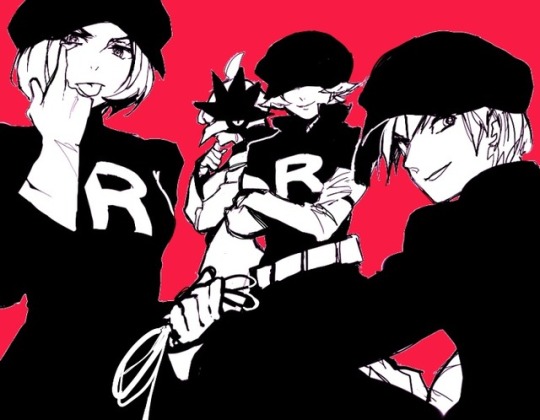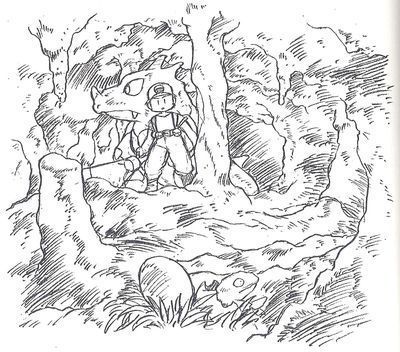#it's a power fantasy for kids Yukio's age
Text

He’s being a bit of a jerk about it, but I do appreciate that Jackie and Yukio realize that what Xcution had was a real bond, even if they were employing it for nefarious purposes. They’re all each other have, you know? So it’s nice to see that neither of them are going to give that up, even if they may have to give up the “supernaturally powered gang” line of work.
#Bleach#Troius reads Bleach#jackie tristan#yukio hans vorarlberna#running a business is actually very hard and not something a child could do#but you know what? this is a comic book#it's a power fantasy for kids Yukio's age#so I'll allow it.
53 notes
·
View notes
Photo

About evil teams in Pokémon world
(Read the full article about How Pokémon world was shaped by real world here: https://www.google.it/amp/s/www.polygon.com/platform/amp/2015/4/10/8339935/pokemon-new-york-tokyo-paris)
I red an article about the connections between the Pokémon world and the real world, and I found some parts of it very interesting and useful to understand, for example, the behaviour of evil teams in the fantasy Pokémon World.
“In some ways the Pokemon world is talking out of two sides of its mouth by showing us a utopia and then also showing us people who are somehow dissatisfied with the current state of things (…) Even as a young American child I was able to see Team Rocket’s connection to the Yakuza, and I imagine most of us did too. But Team Rocket much more closely resembles the bōsōzoku, a motorcycle subculture that rose to prominence in the 1960s. “Bōsōzoku” literally means “to rocket out of control.” The group consisted mainly of disaffected teenagers with poor career prospects who broke petty laws as a sort of initiation process for joining the Yakuza. One facet of Japan’s strange economic policies was the concept of “lifetime employment” — a series of government subsidies that rewards companies for hiring kids directly out of college and then employing them forever. It’s rare that a Japanese company will fire its employees, but it’s also very rare that they’ll hire employees that aren’t fresh college graduates (…) Teenagers with bad grades often knew they had little chance of a successful career, but found solidarity in communal rebellion (…) While the Team Rocket Grunts may resemble the angry teens of the bōsōzoku, the leader of Team Rocket (and the other Pokemon gangs) has a decidedly different personality. Giovanni, Maxie, Archie, Cyrus, N, Ghetsis and Lysandre all follow a very similar archetype: they are visionary leaders who manipulate others into helping them build their ideal world. Each of these leaders also openly surrenders after a moral defeat. This archetype seems to be based on Yukio Mishima, the Nobel-winning author who failed to overthrow the Japanese government in 1970. Mishima and his private army stormed a military base and attempted to inspire a battalion of Japanese soldiers to join him in a coup against the government in order to restore the pre-war power structure. When the soldiers laughed at his speech, Mishima accepted defeat and committed suicide immediately”.
I find all of this very interesting, because of that other part of this article:
“Series creator Satoshi Taijri said in a Time Magazine interview that Pokemon is based on his childhood hobby of catching bugs in the rural outskirts of Tokyo in the 1960s (…) The rural hometown from Taijri’s childhood was completely engulfed by Tokyo’s urban sprawl as the economy exploded. Taijri says that several of his favorite bug catching spots were completely paved over and replaced with suburban arcade centers. Japan’s government accelerated economic growth with “too big to fail” economic practices that could be compared to America’s own housing bubble. And the United States was concerned that if Japan got too poor it would resort to communism, so it justified foreign aid with domino theory.This is all reflected, strangely enough, in Pokemon (…) Pokemon Red’s map isn’t based on present-day Tokyo, it’s based on the pre-sprawl Tokyo of the 1960s. The towns that are connected by forests and rivers in the Pokemon world are connected by concrete and bullet trains in our world. The fantasy of this world is not just that humans and Pokemon live side by side, but that the golden age of Japan never ended. This world is in a state of tranquility while its real-life counterpart was in a state of upheaval (…) Japan’s rapid economic growth also resulted in further economic stratification. And while the world of Pokemon was spared from the “economic miracle” of the 1960s it still, apparently, suffered the social fallout of that period, namely the increase in organized crime”.
So, I thought about something (it’s my personal speculation, my personal view) that fascinated me: the very young Pokémon protagonists, the happy go lucky boys and girls that go exploring the world riding a bycicle, may represent the children, the children’s happy world, and the Pokémon world in general, it’s shaped according to the way children see the world. But in this quiet, pacific world perfectly in balance, the evil teams always appear. The evil teams seem to represent the world of the children who had to grow up but “fail” to become the kind of adults the competitive Japanese society wants them to become. There’s always a clash between good children and evil criminal adults in the Pokémon world. In this dreamy utopic world shaped by children, the haunting spectre of adulthood problems and inner conflicts pop up embodied by the evil grunts that look for a leader, a boss, that would give a meaning to their “loser” lives. The world of adult is cruel, and it’just behind the corner, and the happy go luky Pokémon protagonists have to meet it’s metaphorical representations.
“The President and I are discussing a vital business proposition. Keep your nose out of grown-up matters… Or experience a world of pain!“ - Giovanni
“I’ll show you how terrifying adults can be!” - Tabitha
“You know why being a Trainer is so great? Because when you’re battling, it doesn’t matter if you’re a kid or an adult. Everyone’s equal in Pokémon battle!” - Gladion

#team rocket#Pokemon Villains#pokémon#pokemon#team rainbow rocket#team skull#giovanni#guzma#theory#team rocket boss#evil team
70 notes
·
View notes